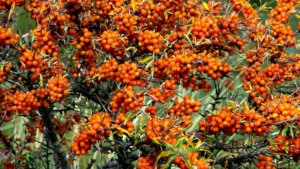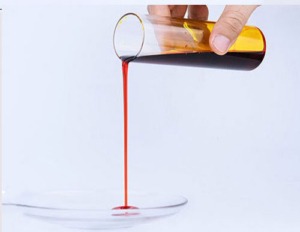Sea buckthorn fruits, seeds and other parts are highly valuable because they contain high content of vitamins A, B1, B12, C, E, K and P; flavonoids, lycopene, carotenoids, and phytosterols. Therapeutically important because they are rich with potent antioxidants. These compounds possess biological and therapeutic activities including antioxidant, cardiovascular, cancer therapy, healing, anti-inflammation, antiradiation effect, treatment of gastrointestinal ulcers, as a liver protective agent, antioxidant, platelet aggregation, and immunomodulator. Consequently, sea buckthorn(H. rhamnoides L.) is often used in traditional medicine.
Platelet Aggregation
Total flavonoids of sea buckthorn may suppress platelet aggregation induced by collagen, probably due to the inhibition of tyrosine kinase activity. It has been reported that collagen receptor stimulation leads to tyrosine phosphorylation of spleen tyrosine kinase or proto-oncogene encoding a tyrosine kinase, followed by phospholipase C-gamma 2 activation. Tyrosine kinase activation increases intracellular calcium and activates phospholipids A2, followed by synthesis of arachidonic acid from phospholipids in plasma membrane. The rate of aggregation reaction (% aggregation/min) was also reduced by sea buckthorn supplementation.
Antioxidant and Antibacterial
 The Sea buckthorn leaf extract exhibited inhibitory effect on the chromium-induced effect of plasma MDA levels. It also restored the intracellular antioxidants such as reduced glutathione and glutathione peroxidase and also exhibited inhibition of ROS/free radical production. It also showed maintenance of mitochondrial and nuclear integrity as well as restoring the phagocytosis by macrophages. The extract also protected animals significantly from the hepatotoxicity by decreasing creatine phosphokinase, serum glutamate oxaloacetate transferase, and serum glutamate pyruvate transferase level compared to the chromium-treated animals.
The Sea buckthorn leaf extract exhibited inhibitory effect on the chromium-induced effect of plasma MDA levels. It also restored the intracellular antioxidants such as reduced glutathione and glutathione peroxidase and also exhibited inhibition of ROS/free radical production. It also showed maintenance of mitochondrial and nuclear integrity as well as restoring the phagocytosis by macrophages. The extract also protected animals significantly from the hepatotoxicity by decreasing creatine phosphokinase, serum glutamate oxaloacetate transferase, and serum glutamate pyruvate transferase level compared to the chromium-treated animals.
Antiulcer
The antiulcer action of sea buckthorn oils related to an increase in the hydrophobicity of the mucosal surface, retarded the gastric emptying, inhibited lipid peroxidation in gastric mucosa, accelerated of the mucosal repair, inhibited proteolytic activity in gastric liquid, promoted the wound reparation processes of mucosa and prevent mucosa damage.
Anti-Inflammatory
Lymphocyte proliferation decreased by sea buckthorn clearly indicates inhibition of T-cell activation. Due to the presence of some mitogens in sea buckthorn, it stimulated lymphocyte proliferation. Sea buckthorn had reductive effect on C-reactive protein, a marker of inflammation and a risk factor for cardiovascular diseases. It was possible that inhibition of nitric oxide (NO) production by sea buckthorn leaf extract could be due to inhibition of transcription of the iNOS gene which was quite evident at translation level on probing with Moab against iNOS. The onset of the NO production cascade induced by lipopolysaccharides in macrophages required a number of steps such as the activation of nuclear factor (NF)-kh and subsequent iNOS mRNA expression.
Anticancer
Sea buckthorn, with major constituents includes, quercetin-induced apoptosis in cancer cells, such as HT- 29 human colon cancer cells, HL-60, and K562 human leukemia cells, baicalin-induced apoptosis in prostate cancer cells. Sea buckthorn juice not only inhibits growth of the human gastric carcinoma and lymphatic leukemia but kills both S180 and P388 cancer cells. Sea buckthorn juice decreased genotoxic effect of cisplatin on somatic and germ cell of mice. Sea buckthorn fruit is able to decrease carcinogen-induced stomach and skin tumorigenesis, which might involve upregulation of phase II and antioxidant enzymes as well as DNA-binding activity of IRF-1, a known antioncogenic transcription factor causing growth suppression and apoptosis induction for its anticancer effect. sea buckthorn can be anticipated that the antimutagenic activity via antioxidative mechanism. Sea buckthorn juice can block the endogenous formation of N-nitroso compounds more effectively than ascorbic acid and thereby prevent tumor production.
Hepatic Disease
Sea buckthorn could reduce the serum levels of laminin, hyaluronic acid, total bile acid, and collagen types III and IV in patients with liver cirrhosis, demonstrating that it may restrain the synthesis of collagen and other components of extracellular matrix. Sea buckthorn also fixes vitamin A and RAR contents of hepatic stellate cells (HSCs), so as to keep HSCs in a quiescent status and to prevent progression of liver fibrosis. Sea buckthorn has apparent hepatoprotective properties and alleviating liver injury caused by carbon tetrachloride.
Cardiac Effect
Sea buckthorn flavonoids could improve the mechanocardiography and the ischemic electrocardiogram. Sea buckthorn increased the internal pressure peak of the left ventriculus and its maximum rate of change (dp/dtmax) distinctly, the time from the left ventricle starting a contraction to the occurrence of a dp/dtmax was shortened 4 distinctly, the diastolic pressure of the left ventricle and the left ventricular pressure of the isovolumetric relaxation phase diminished, and cardiac output, cardiac index, heart stroke index, and left ventricular power index of the myocardium increased. Further research showed that sea buckthorn flavonoids could strengthen the contractility of the extracorporeal papillary muscles of guinea pigs. Sea buckthorn flavonoids could prolong the time of ventricular fibrillation, postpone the atrioventricular conduction, lower the heart rate, and attenuate the myocardial contractility.
Antihypertensive Effect
In view of the previous researches that sea buckthorn flavonoids is effective in decreasing the concentration of intracellular-free calcium induced by angiotensin-2 in vascular smooth muscle cells by blocking receptor-operated calcium channels, it is possible to conclude that sea buckthorn flavonoids exerts its antihypertensive effect, in part, by blocking angiotensin-2 receptor on cell surface and thus arrest downstream signal pathway. In sum, hypertension, hyperinsulinemia, dyslipidemia, and activated angiotensin-2 provoked by the high-sucrose diet can be ameliorated or modulated by total flavones purified from seed residues of sea buckthorn, and the best effect was shown at the dose of 150 mg/kg/day.
Healing
Sea buckthorn promotes cutaneous wound healing, burns wound healing, and dermals wound healing by increasing antioxidant and protecting again sulfur dioxide and mustard-gas-induced injury. Sea buckthorn flavonoids enhanced mechanical strength of healing tendons and can thus be credited to enhance collagen deposition and collagen maturation with an altered cytokine profile in the wound. Sea buckthorn flavonoids may increase TGFβ1 and fibrogenic cytokine that stimulates collagen production in tendons and decreases COX-2 in the healing tendons. Sea buckthorn seed oil significantly attenuated hypoxia-induced oxidative stress, maintaind blood-brain barrier membrane integrity, restricted the rise in plasma catecholamine, and significantly enhanced the hypoxic tolerance in experimental animals. Sea buckthorn seed oil also decrease the level of stress hormones and enhances hypoxic tolerance in animals exposed to hypoxia indicating its antistress and adaptogenic activity against hypoxia.
Radiation
The radio protective effect generated by sea buckthorn at molecular level in terms of free radical scavenging as studied through in-vitro studies could explain the cellular survival, proliferation enhancement, immunostimulation, and ultimately the whole body survival. Maintenance of chromatin organization, induction of hypoxia, protects hydrogen atom donation, free radical scavenging, and blocking of cell cycle at G2-M phase by interfering with topoisomerase-I activity and mitochondrial and genomic DNA from radiation seem to contribute towards the radio protective efficacy of sea buckthorn.
Atopic Dermatitis
Sea buckthorn seed oil treatment increased the level of a-linolenic, linoleic, and eicosapentaenoic acids, whereas pulp oil supplementation β-Sitosterol and β-carotene in the oils may also have effected on the symptoms of Atopic dermatitis.
Anti-Atherogenic and Hypoglycemic Activity
Atherogenic index was significantly reduced and acetylcholine-induced vasorelaxation was markedly impaired which could be restored to control values in sea buckthorn seed oil treated normally and hypercholesterolemic animals. Sea buckthorn decreases blood glucose and lipid in normal mice, and effect of sea buckthorn on glycometabolism may be related to the control of gluconeogenesis.

Leave A Comment